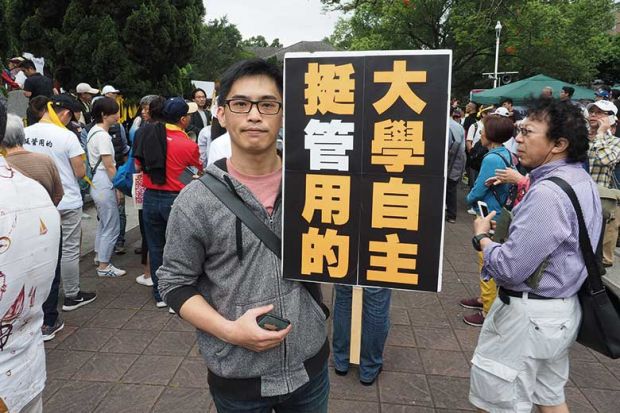Across Asia and further afield, it is not uncommon for politicians to bring down university presidents. In Taiwan, however, the tumult surrounding the appointment of the new leader of the state’s flagship institution has seen three education ministers step down before he even started in the role.
Chung-ming Kuan was elected president of National Taiwan University in January last year but started in the position only this month – 11 months after the original start date – because of delays in the process of gaining government approval. Taiwanese universities have autonomy to select their own leaders, but the appointments must be ratified by the Education Ministry.
The controversy ostensibly centres on Professor Kuan’s failure to report during the selection process his role as an independent board member at Taiwan Mobile. Three executives of the company sat on the 21-member university committee that chose Professor Kuan to become president. He was also accused of taking up posts at universities in mainland China, in breach of government rules.
Meanwhile, Chang Liao Wan-chien, a legislator and member of the ruling Democratic Progressive Party (DPP), alleged that part of an academic paper that Professor Kuan presented in May 2017 had been plagiarised. Professor Kuan denied the charges.
Many suspect that the delays and allegations were part of a government attempt to overturn the appointment because Professor Kuan had served as a minister and head of the National Development Council in the previous pro-China Kuomintang (KMT) government.
Three education ministers have resigned, apparently over the controversy. Pan Wen-Chung stood down last April over pressure that he was delaying Professor Kuan’s approval, while Wu Maw-kuen left in May amid pressure from the KMT after facing allegations of possible misconduct of his own.
Yeh Jiunn-rong resigned on 25 December, a day after approving Professor Kuan’s appointment, stating that he was stepping down to shoulder the political responsibility for any problems that his decision on the case caused. The surprise approval was seen as an attempt by the DPP to recover from a loss of support in local elections in November that was blamed on the controversy.
Yuan-Chih Fu, assistant professor at National Chung Cheng University, said that the majority of NTU’s past presidents were pro-DPP and in favour of Taiwanese independence. Meanwhile, the majority of Cabinet members in the DPP government, and the former KMT administration, are alumni or faculty of NTU.
“Given this unique connection between NTU and the political circle, [the DPP] sees NTU as a beachhead [that] cannot be lost,” he said. “The NTU selection event is a very bad example showing how political power affects academic governance.”
Chia-Ming Hsueh, assistant research professor at National Cheng Kung University, said that Professor Kuan’s case was “unique and political, but it also disclosed some flaws in the selection process that the government and the university need to improve”. He argued that while the case had caused “some social unrest…it won’t really hurt the core value of higher education in Taiwan”.
However, Bi-Yu Chang, deputy director of the Centre of Taiwan Studies at SOAS University of London, said that the incident would have “a greater impact on the academic environment” across Taiwan, citing a “potential deterioration of academic autonomy and a growing politicisation tendency”.
POSTSCRIPT:
Print headline: Three ministers out, one president in
Register to continue
Why register?
- Registration is free and only takes a moment
- Once registered, you can read 3 articles a month
- Sign up for our newsletter
Subscribe
Or subscribe for unlimited access to:
- Unlimited access to news, views, insights & reviews
- Digital editions
- Digital access to THE’s university and college rankings analysis
Already registered or a current subscriber? Login








